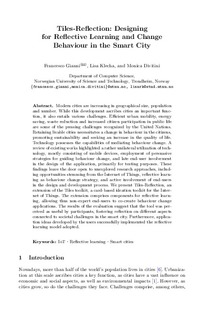Tiles-Reflection: Designing for Reflective Learning and Change Behaviour in the Smart City
Chapter
Accepted version

Åpne
Permanent lenke
http://hdl.handle.net/11250/2626271Utgivelsesdato
2019Metadata
Vis full innførselSamlinger
Originalversjon
10.1007/978-3-319-92022-1_7Sammendrag
Modern cities are increasing in geographical size, population and number. While this development ascribes cities an important function, it also entails various challenges. Efficient urban mobility, energy saving, waste reduction and increased citizen participation in public life are some of the pressing challenges recognized by the United Nations. Retaining livable cities necessitates a change in behaviour in the citizens, promoting sustainability and seeking an increase in the quality of life. Technology possesses the capabilities of mediating behaviour change. A review of existing works highlighted a rather unilateral utilization of technology, mostly consisting of mobile devices, employment of persuasive strategies for guiding behaviour change, and late end-user involvement in the design of the application, primarily for testing purposes. These findings leave the door open to unexplored research approaches, including opportunities stemming from the Internet of Things, reflective learning as behaviour change strategy, and active involvement of end-users in the design and development process. We present Tiles-Reflection, an extension of the Tiles toolkit, a card-based ideation toolkit for the Internet of Things. The extension comprises components for reflective learning, allowing thus non-expert end-users to co-create behaviour change applications. The results of the evaluation suggest that the tool was perceived as useful by participants, fostering reflection on different aspects connected to societal challenges in the smart city. Furthermore, application ideas developed by the users successfully implemented the reflective learning model adopted.